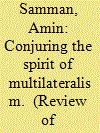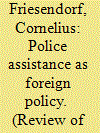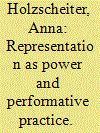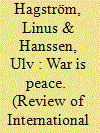|
|
|
Sort Order |
|
|
|
Items / Page
|
|
|
|
|
|
|
| Srl | Item |
| 1 |
ID:
144055


|
|
|
|
|
| Summary/Abstract |
In recent years, critical scholars have emphasised how the recollection of past events as traumas can both constrain and widen the political possibilities of a present. This article builds on such research by suggesting that the management of contemporary financial crises is reliant on a ritual work of repetition, wherein prior ‘crisis’ episodes are called upon to identify and authorise specific sites and modes of crisis management. In order to develop this argument, I focus on how past crises figure within the public pronouncements of four key policymaking organisations during the financial instability of 2007–9. I find that while the Great Depression does enable these organisations to reaffirm old ways of managing crises, both it and the more recent Asian crisis are also made to disclose new truths about the evolution of multilateralism as a form of governance. In so doing, I argue, these historical narratives reveal how the management of global financial crisis depends upon a kind of ‘magic trick’. Rather than a strictly rational, historical process of problem solving, contemporary crises are instead negotiated through a contingent and self-referential conjuring of crisis-histories.
|
|
|
|
|
|
|
|
|
|
|
|
|
|
|
|
| 2 |
ID:
144058


|
|
|
|
|
| Summary/Abstract |
Is the relatively long peace of Northeast Asia a result of crisis stability or general stability? The article introduces two stability concepts – crisis and general stability. Crisis stability occurs when both sides in military crisis are so secure due to its military capability and are able to wait out a surprise attack fully confident that it would be able to respond with a punishing counter attack. On the other hand, general stability prevails when two powers greatly prefer peace even to a victorious war whether crisis stability exists or not, simply because war has become inconceivable as a means of solving any political disagreements and conflicts. While crisis stability entails delicate balance of military power from the deterrence literature of security studies, general stability bases its logic of inquiry on constructivism where the idea of war aversion – categorically rejecting war as a means to end conflicts – becomes the prevailing norm. Therefore, this article empirically examines how Northeast Asia has sustained its peace through crisis stability and presents a new trend toward general stability.
|
|
|
|
|
|
|
|
|
|
|
|
|
|
|
|
| 3 |
ID:
144061


|
|
|
|
|
| Summary/Abstract |
The role of Eurocentrism in International Relations (IR) has become a focal point for critical scholarship. However, anti-Eurocentric scholars tend to overlook the extent to which Eurocentrism is a tempo-spatial phenomenon whose roots and development need to be analysed in a way that takes its internal differences into account. This article rejects a single notion of Eurocentrism, proposing instead to understand Eurocentrism through its three forms: historical-contextual, ideological, and residual. This differentiation can provide a means for dealing with the challenges of Eurocentrism in a more self-reflexive manner without seeing it as omnipresent and unchanging. It also offers to approach Eurocentric IR from a perspective that considers the role of historiographical differences in understanding the rise of European powers. This means that IR cannot base its explanatory frameworks on a single (the) historical record. Understanding the limits of Eurocentrism and of anti-Eurocentrism provides a better means for dealing with the formerʼs problematic impact on IR scholarship.
|
|
|
|
|
|
|
|
|
|
|
|
|
|
|
|
| 4 |
ID:
144056


|
|
|
|
|
| Summary/Abstract |
This article addresses the relationship between history and the international. Starting from the ‘history controversy’ in IR in the 1980s and 1990s, it shows that that debate hinged on the political import of history as a form of knowledge. This political meaning, to which agency and freedom were central, was challenged through the theorisation in IR of the problematic relationship of the international, as a fragmented political form, to historical time: the spatial inside–outside division was understood as carrying a corresponding temporal and historical division, between progress and repetition. To explain why history carried this political significance, the article explores the connection of historical consciousness to sovereignty and political subjectivity. It shows that history as a distinctively modern form of relation to ‘the past’ is inseparable from the rise of modern sovereign authority and its accompanying political subject and idea of freedom: sovereignty’s reformulation of political space went along with a refashioning of the character of historical time. However, history’s conceptual attachment to sovereignty also ties it to the fragmented form of the international. History thus finds its limits in the international and IR becomes a site for the critique of the relationship between history, political form, and subjectivity.
|
|
|
|
|
|
|
|
|
|
|
|
|
|
|
|
| 5 |
ID:
144059


|
|
|
|
|
| Summary/Abstract |
Norm dynamics studies typically accord a special status to norm entrepreneurs, actors who promote new global norms. But conceptually privileging these agents of change has meant the norm dynamics literature has become unbalanced and marred by case selection bias. Accordingly, an oppositional role – the ‘norm antipreneur’ – should be recognised to correct these problems. When the normative status quo in an issue-area is entrenched, a clear distinction can be drawn between the entrepreneurs and antipreneurs, because in these contexts the antipreneurs enjoy significant but under-appreciated tactical and strategic advantages. Recognising this enables the construction of a norm dynamics role-spectrum – a sort of ‘typology of roles’ – including ‘competitor entrepreneur’ and ‘creative resister’ in addition to the entrepreneur and antipreneur roles which actors might play in particular norm contestation contexts. Understanding these roles promises to improve analyses of the dynamic interactions between actors in particular norm contestation processes, thereby bringing greater overall balance to the norm dynamics literature.
|
|
|
|
|
|
|
|
|
|
|
|
|
|
|
|
| 6 |
ID:
144062


|
|
|
|
|
| Summary/Abstract |
Police assistance is an important, albeit understudied aspect of foreign policy. While many scholars have studied international and transnational policing, it remains largely unknown why donor police forces often support their colleagues in fragile states in different ways. This article discusses a variety of potential explanations of police assistance: a domestic rational actor model; a constructivist focus on international norms; and theories on the use of force by democracies. While all of these explanations are relevant, this article shows that they remain incomplete without studying police organisations and how these implement assistance on the ground. As the organisational cultures of donor police agencies differ, so do their assistance practices. The case of German and Italian police assistance in Afghanistan illustrates the relevance of an organisational approach: despite operating in the same environment, German police officers promoted civilian and Italian Carabinieri militarised policing. The article stresses that explaining security assistance, an important form of indirect intervention in fragile states, requires zooming in on policy implementation and policy implementers.
|
|
|
|
|
|
|
|
|
|
|
|
|
|
|
|
| 7 |
ID:
144054


|
|
|
|
|
| Summary/Abstract |
This article analyses global civil society advocacy in the field of child labour through the lens of theories on political representation in global governance. The article is sympathetic to newer theories on political representation which, fundamentally, understand representation as a dialectic of performative practices between representatives and their real or imagined constituencies. However, the article argues that the contemporary literature on political representation turns a blind eye on two aspects that are central to understanding this dialectic of representation in the child labour case: first, representation as power and second, the contested nature of citizenship. The article thus proposes an approach to political representation that allows highlighting the power-dimension inherent to the interrelation between formal and performative aspects of representation, that is, between civil society actors’ power to represent and their power over representation. Using such an approach, the article presents empirical insights on CSO representation in global policymaking on child labour – a field in which conflicts over legitimate representation, citizenship, and grassroots participation continue to be exceptionally fierce.
|
|
|
|
|
|
|
|
|
|
|
|
|
|
|
|
| 8 |
ID:
144060


|
|
|
|
|
| Summary/Abstract |
Scholars from the recent ‘practice turn’ in International Relations have urged us to rethink the international realm in terms of practices. The principal exponents of the turn, Emanuel Adler and Vincent Pouliot, have refurbished Pierre Bourdieu’s theory of practice to produce their own account of international practices. In a review of the practice turn, Chris Brown has argued that Bourdieu’s notion of practice shares basic affinities with Aristotle’s concept of praxis. While practice turn scholars may not adhere to a rigid canon of thought, they seem to share an Aristotelian conception of praxis. This reading of the turn to practice, though plausible, captures one part of the story. The central thesis of the present article is that instead of one there are two, distinctive conceptions of practice – Aristotelian and Wittgensteinian – and therefore two distinctive ways in which the character of international practices might be understood. More concretely, the aim is to show that the conception of international practices, rooted in Wittgenstein’s view of practices as language-games, can be particularly illuminating to all those who seek to understand international relations.
|
|
|
|
|
|
|
|
|
|
|
|
|
|
|
|
| 9 |
ID:
144057


|
|
|
|
|
| Summary/Abstract |
This article demonstrates that a national identity defined by a normative commitment to peace is not necessarily an antidote to remilitarisation and war. More specifically, the article takes issue with the debate about the trajectory of Japan’s security and defence policy. One strand of the debate holds that Japan is normatively committed to peace while the other claims that Japan is in the process of remilitarising. This article argues that the two positions are not mutually exclusive – a point that has been overlooked in the literature. The article uses discourse analysis to trace how ‘peace’ was discussed in debates about China in the Japanese Diet in 1972 and 2009–12. It demonstrates how rearticulations by right wing discourses in the latter period have depicted peace as something that must be defended actively, and thus as compatible with remilitarisation or military normalisation. Japan’s changing peace identity could undermine rather than stabilise peaceful relations with its East Asian neighbours.
|
|
|
|
|
|
|
|
|
|
|
|
|
|
|
|
|
|
|
|
|